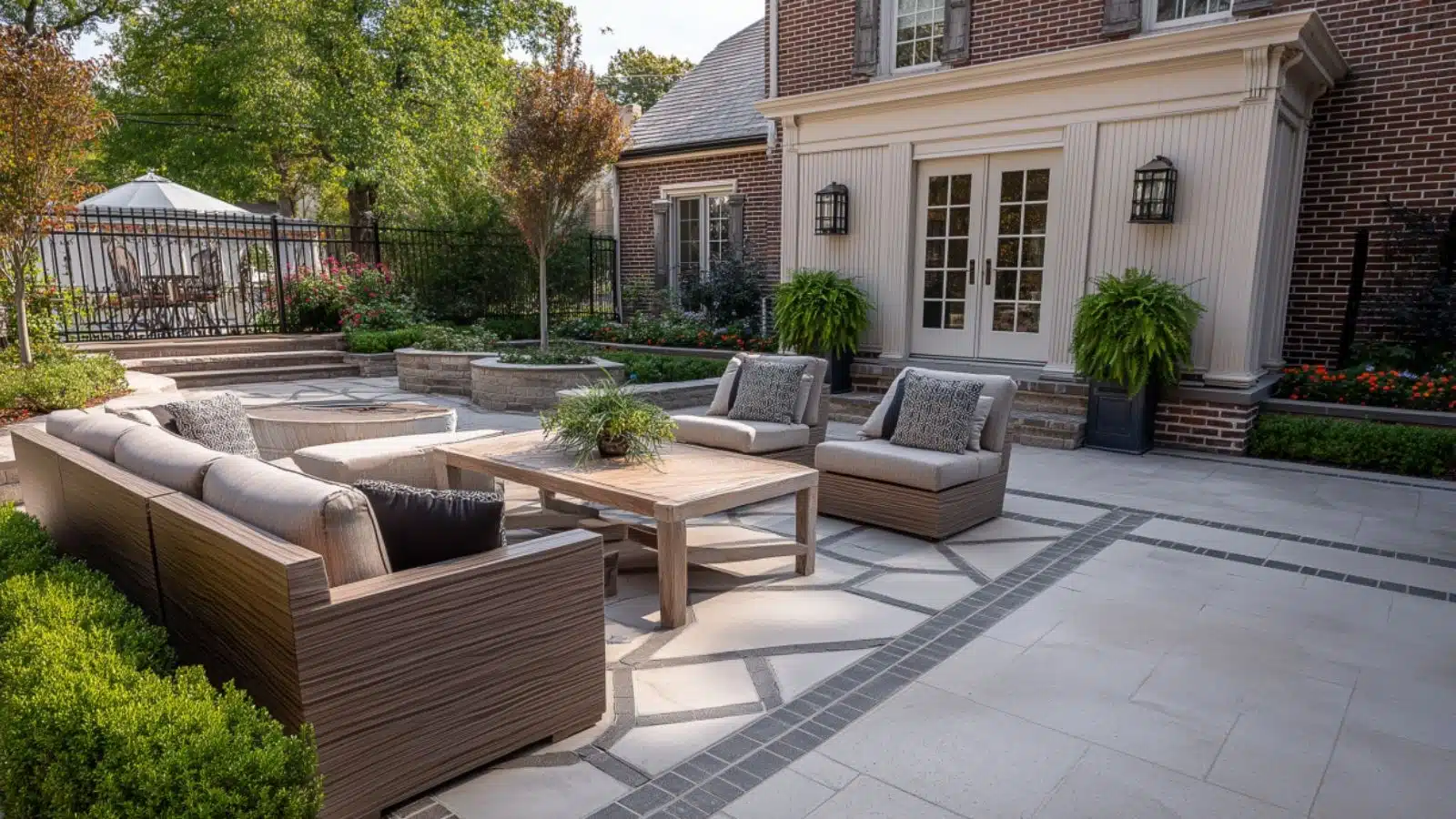Creative Borders and Edging for Stamped Concrete Patio Designs That Add Stunning Detail
Table of Contents
Stamped concrete patios have become a standout feature in modern home decor—combining durability with the charm of natural stone, brick, or tile. But while the center of a patio often draws initial attention, it’s the borders and edges that elevate the design from standard to spectacular.
According to the American Society of Landscape Architects, 70% of homeowners prioritize outdoor living spaces in their home improvement plans. And in the world of concrete patio design, the small details—like creative borders and decorative edging—are what truly personalize a space and give it lasting visual appeal.
Whether you’re going for a polished, modern look or a rustic retreat, the right border can frame your patio like a work of art. It helps define the space, adds contrast, and draws the eye outward. From contrasting stamp patterns and color washes to stone-textured bands and custom-cut curves, there are countless ways to design edges that complement your stamped concrete surface.
This blog will guide you through the most creative and stylish border and edging ideas for stamped concrete patios. You’ll learn about materials, techniques, layout tips, and aesthetic pairings to help you choose options that align with your home’s architecture and outdoor vibe.
Using Contrasting Stamp Patterns for Definition
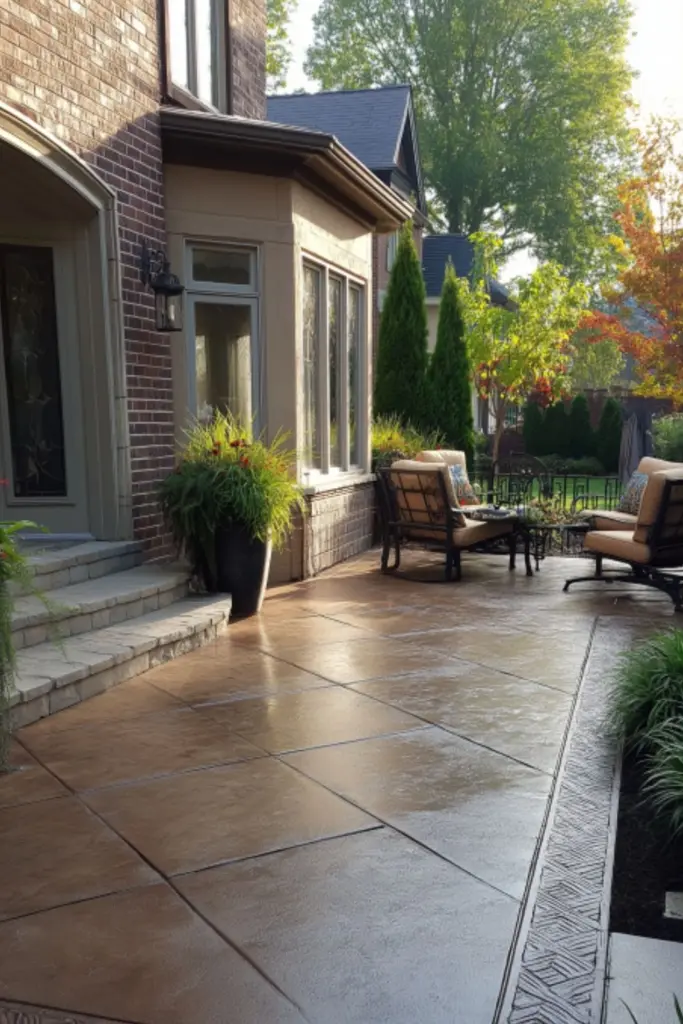
One of the simplest yet most striking ways to design stamped concrete borders is by using a contrasting stamp pattern. This approach provides immediate visual separation between the patio’s central area and its perimeter, creating a clean and purposeful look.
For instance, if the center of your patio uses a cobblestone or slate texture, the border might use an ashlar cut stone or brick stamp. The key is balance—while contrast should be noticeable, it shouldn’t feel disjointed. Choosing patterns that share similar line work or scale often results in the most cohesive outcome.
Stamped borders are typically poured and stamped separately from the main slab, which allows for more control during installation. You can also vary the direction of the stamp—such as laying the border at a diagonal or perpendicular angle to the center pattern—to subtly distinguish the edge without introducing a new texture altogether.
Pattern Pairing Guide
| Center Pattern | Ideal Border Pattern | Design Effect |
|---|---|---|
| Slate or flagstone | Brick or cobblestone | Rustic and traditional contrast |
| Ashlar stone | Smooth border with frame lines | Formal and elegant |
| Wood plank stamped | Textured stone or sand finish | Natural and mixed-material appearance |
| Herringbone brick | Soldier course brick pattern | Symmetrical and refined look |
Color Accents and Staining for Artistic Contrast
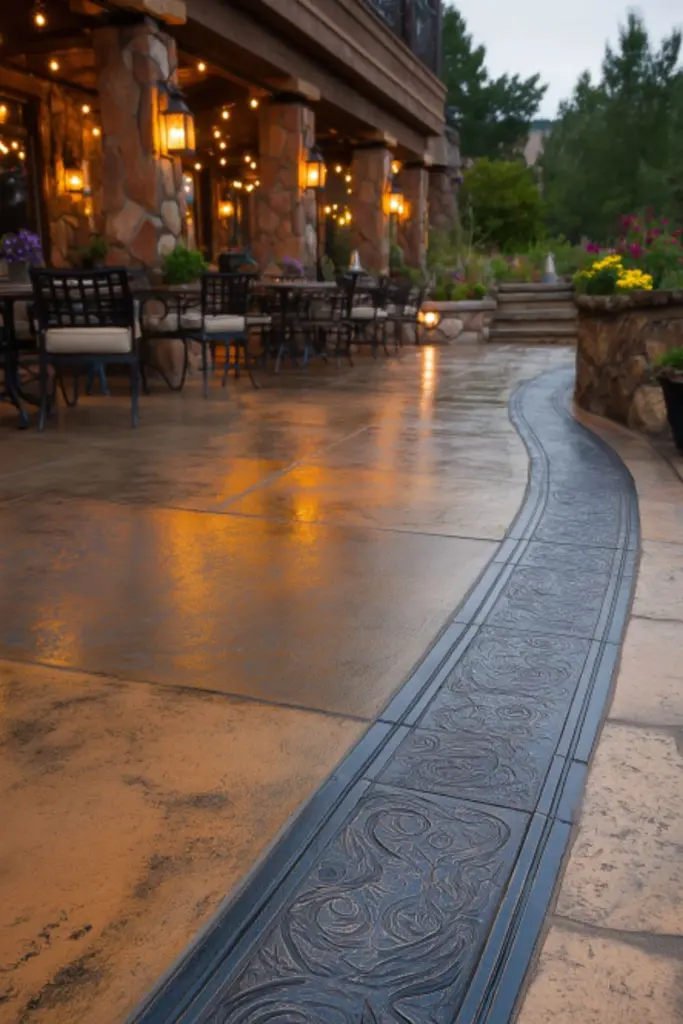
Color is a powerful tool in patio design, especially when used to highlight borders and edging. With stamped concrete, you can introduce contrast using integral colors, surface-applied color hardeners, or chemical stains that create rich, variegated effects.
Border colors are typically chosen to complement either the home’s exterior or surrounding landscape elements. For example, a warm terracotta border can mirror clay roof tiles, while a charcoal edge may match black window trims or fence lines. For those wanting a bolder look, high-contrast combinations—like light tan with deep slate—create a strong visual boundary.
Water-based stains or tinted sealers offer another dimension, allowing for decorative techniques such as antiquing, marbling, or layered shading. These effects give your patio a more artisanal quality while protecting the concrete surface.
Color Selection Matrix
| Main Surface Color | Recommended Border Color | Tone Effect | Style Match |
|---|---|---|---|
| Light beige | Rich walnut or espresso | Warm and grounding | Mediterranean, rustic, traditional |
| Gray slate | Charcoal or black | Cool and contemporary | Modern, industrial |
| Sandstone brown | Terra cotta or burnt sienna | Earthy and vibrant | Southwestern, Spanish, coastal |
| Soft white | Muted sage or steel blue | Subtle and elegant | Scandinavian, cottage-style |
Using Textured Edging to Mimic Natural Materials
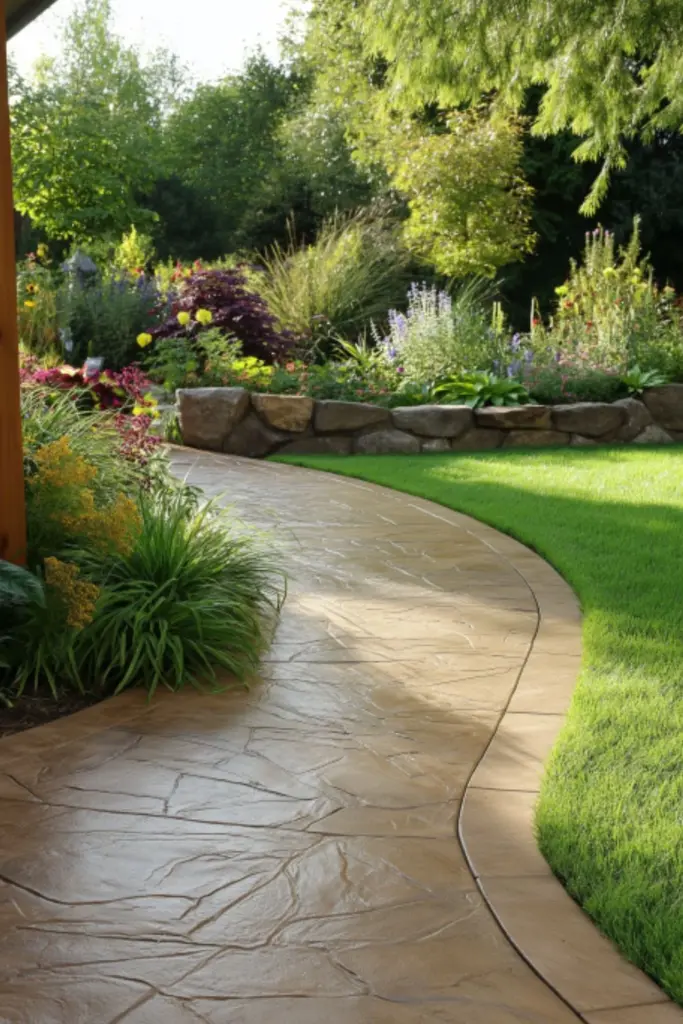
Textured borders offer the perfect illusion of luxury materials—like stone, brick, or wood—without the upkeep or cost. By stamping the edge of the concrete patio with detailed molds, you can mimic the character and texture of natural elements while benefiting from concrete’s resilience.
Popular texture options for edging include chiseled stone, ledgestone, and even timber planks. These work well to soften the transition between the stamped patio and a lawn, gravel path, or garden bed. Many designs also incorporate hand-tooled grout lines or textured mats to deepen realism.
For a rustic outdoor kitchen area, consider a timber-style border around a slate-stamped floor. Or in a formal garden setting, a chiseled stone edge can add old-world elegance. These textures can be enhanced with antique stains to highlight crevices and natural shadows.
Textured edging is not only beautiful—it’s functional. Rougher finishes increase traction at the edge, making the patio safer when wet. It also clearly defines the border visually, preventing foot traffic from spilling into surrounding landscapes.
Popular Textured Edging Options
| Texture Type | Visual Style | Ideal Setting |
|---|---|---|
| Chiseled stone | Aged and rustic | Classic gardens, farmhouse patios |
| Wood plank | Natural, cabin-like | Rustic decks, lakeside homes |
| Brick edge | Traditional and clean | Colonial or suburban patios |
| Ledgestone | Formal and sculpted | Courtyards, symmetrical garden layouts |
| Rough sand finish | Understated, naturalistic | Desert gardens, minimal landscapes |
Curved Borders for Organic Flow
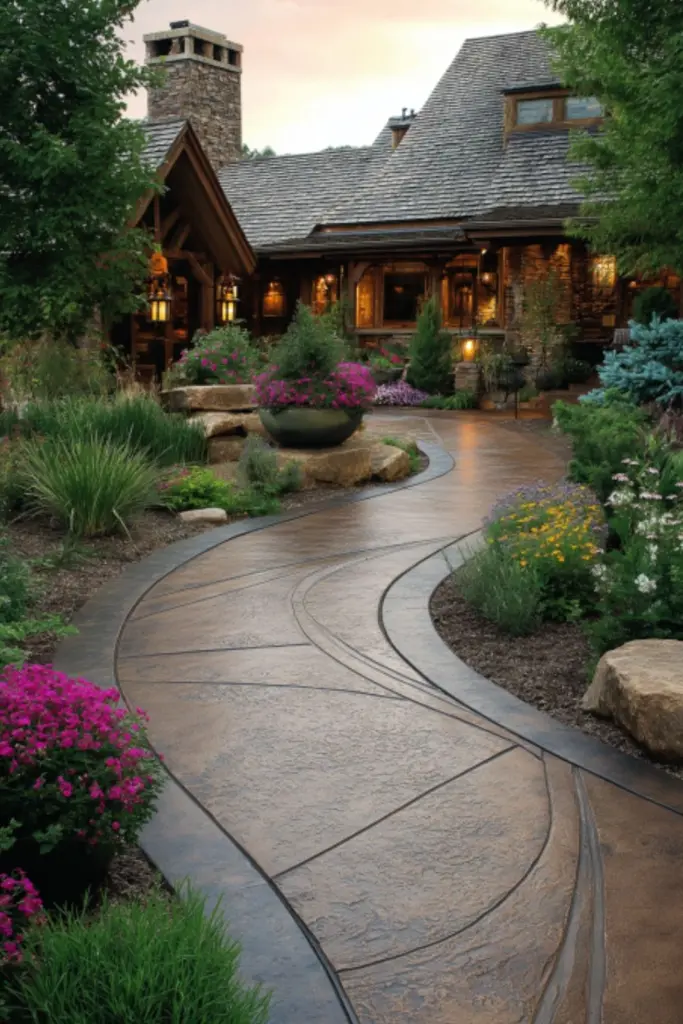
Straight lines may be the default in patio design, but curved borders bring a more relaxed, organic feel—especially when paired with gardens or irregular lot lines. Incorporating gentle arcs or flowing lines into your stamped concrete patio edge helps the design blend naturally with the surrounding environment.
Curved edging works beautifully with circular patios, freeform pool decks, or spaces designed around focal points like fire pits or water features. To execute a clean curved border, professionals use flexible forms during the concrete pour, followed by curved stamping tools or hand-troweled finishes.
For contrast, use a different stamp pattern in the border or stain the curve in a darker tone. Gentle curves in walkways and patio perimeters are also easier on the eye and encourage movement through the space, which is why landscape designers often favor them in fluid garden designs.
Benefits of Curved Edging
| Design Element | Visual Effect | Functional Benefit |
|---|---|---|
| Soft arcs | Natural, flowing appearance | Blends with landscaping |
| Circular borders | Adds formality or symmetry | Highlights fire pits or round furniture |
| Meandering paths | Relaxed and inviting | Guides foot traffic gracefully |
| Irregular outlines | Artistic and unique | Accommodates terrain or obstacles |
Combining Borders with Inlays or Decorative Bands
For those seeking high-end, artistic detail, combining your stamped concrete border with decorative inlays or bands can elevate your patio to a custom showpiece. Inlays may be contrasting concrete sections, colored aggregate, or even metal or tile accents embedded into the surface.
Use bands to frame seating areas, create faux “rugs,” or highlight outdoor kitchen zones. These additions help organize a large patio visually and can mirror architectural details found elsewhere in your home—like arched windows or geometric tile work.
Color and pattern combinations for bands are nearly limitless. A wood plank inlay framed by a smooth concrete border creates a deck-like look without the maintenance. Or, insert a mosaic tile strip into a troweled edge for Mediterranean flair.
Creative Border Combo Ideas
| Feature Type | Combination | Visual Result |
|---|---|---|
| Central inlay | Decorative compass rose | Focal point for gathering spaces |
| Framed seating area | Wood-look inlay + stamped border | Faux deck within patio |
| Tile insert strip | Ceramic tile between smooth edges | Adds color and hand-crafted style |
| Pebble band | Colored aggregate within border | Rustic and textured detail |
Integrating Borders with Landscape Features
The most successful stamped concrete patios are those that feel like a natural extension of their environment. When designing your borders and edging, consider how they transition into the rest of your landscape. Do they lead into a garden bed? Merge with a gravel path? Align with retaining walls or fences?
Seamless integration enhances both function and beauty. A lightly textured concrete border may lead into a mulch bed with native grasses, while a brick-stamped edge might mirror a nearby retaining wall. Echoing materials or colors in adjacent structures—like planter boxes or outdoor steps—helps unify the entire backyard.
For patios next to pools, opt for slip-resistant, light-colored borders that stay cool underfoot. If your patio connects to a lawn, keep edging low-profile and curved to avoid mowing hazards.
Incorporating lighting into the edging is another advanced way to enhance atmosphere. LED strip lights or solar edge lights add evening ambiance and help guests navigate the space after dark.
Landscape Integration Tips
| Border Design Element | Landscape Feature to Match | Suggested Strategy |
|---|---|---|
| Stone-stamped edge | Retaining wall or fire pit | Use same color wash or texture |
| Light concrete border | Pool coping or water features | Choose slip-resistant finish |
| Brick pattern edge | Garden paths or house accents | Match shape and tone |
| Inset lighting | Flower beds or walkway curves | Place low-voltage lights along border |
| Curved edging | Organic garden lines | Mirror shapes in plant beds |
Conclusion
Borders and edging may seem like finishing touches, but in stamped concrete patio design, they’re essential elements that define, enhance, and personalize your outdoor space. Whether you prefer bold contrasts, gentle curves, textured realism, or integrated artistry, there are endless ways to elevate your patio from basic to breathtaking.
By thoughtfully combining colors, textures, patterns, and layout features, you can create a stamped concrete patio that feels both polished and uniquely yours. The best designs are those that blend beauty with function—inviting you to relax, entertain, and enjoy your outdoor living space for years to come.

